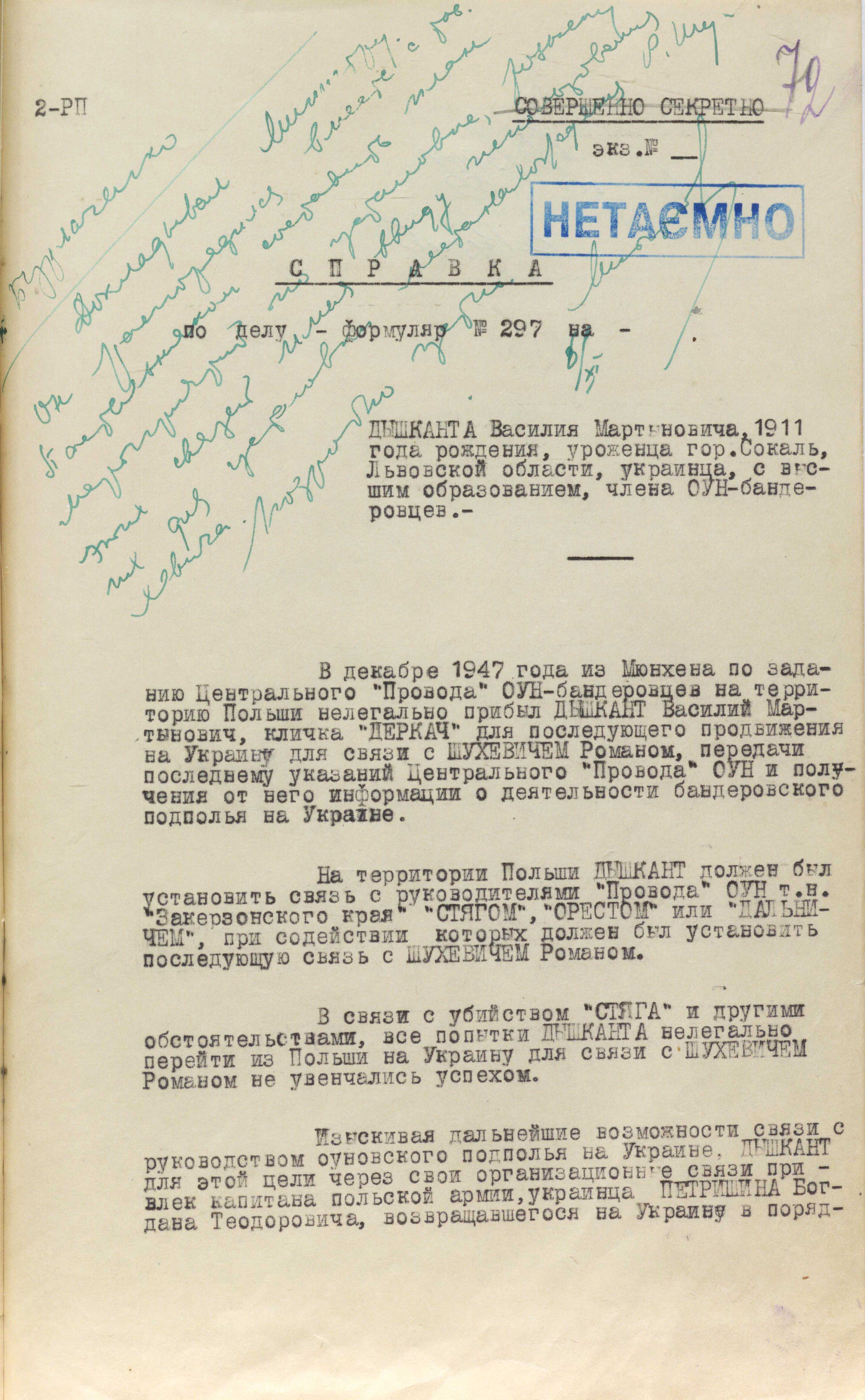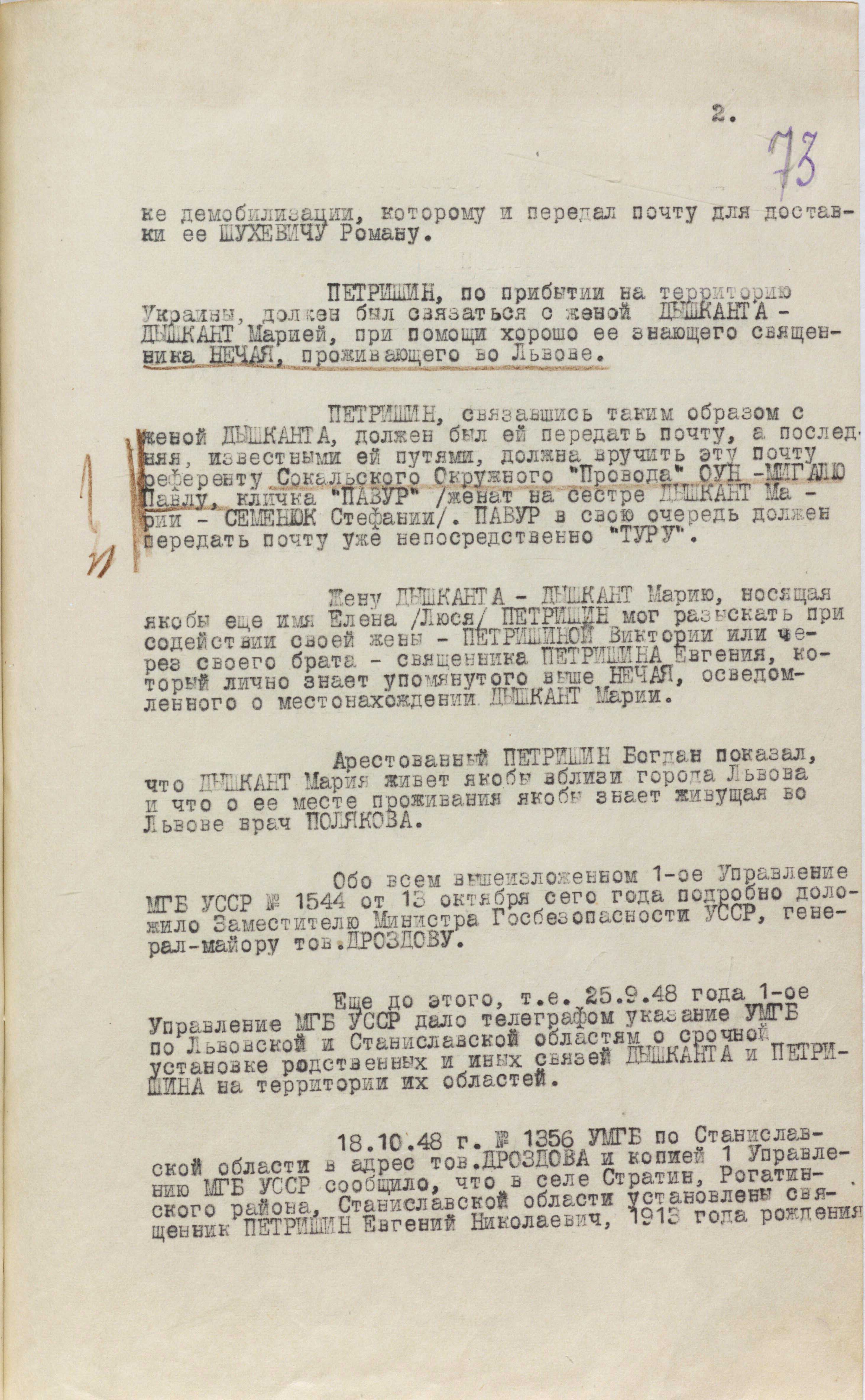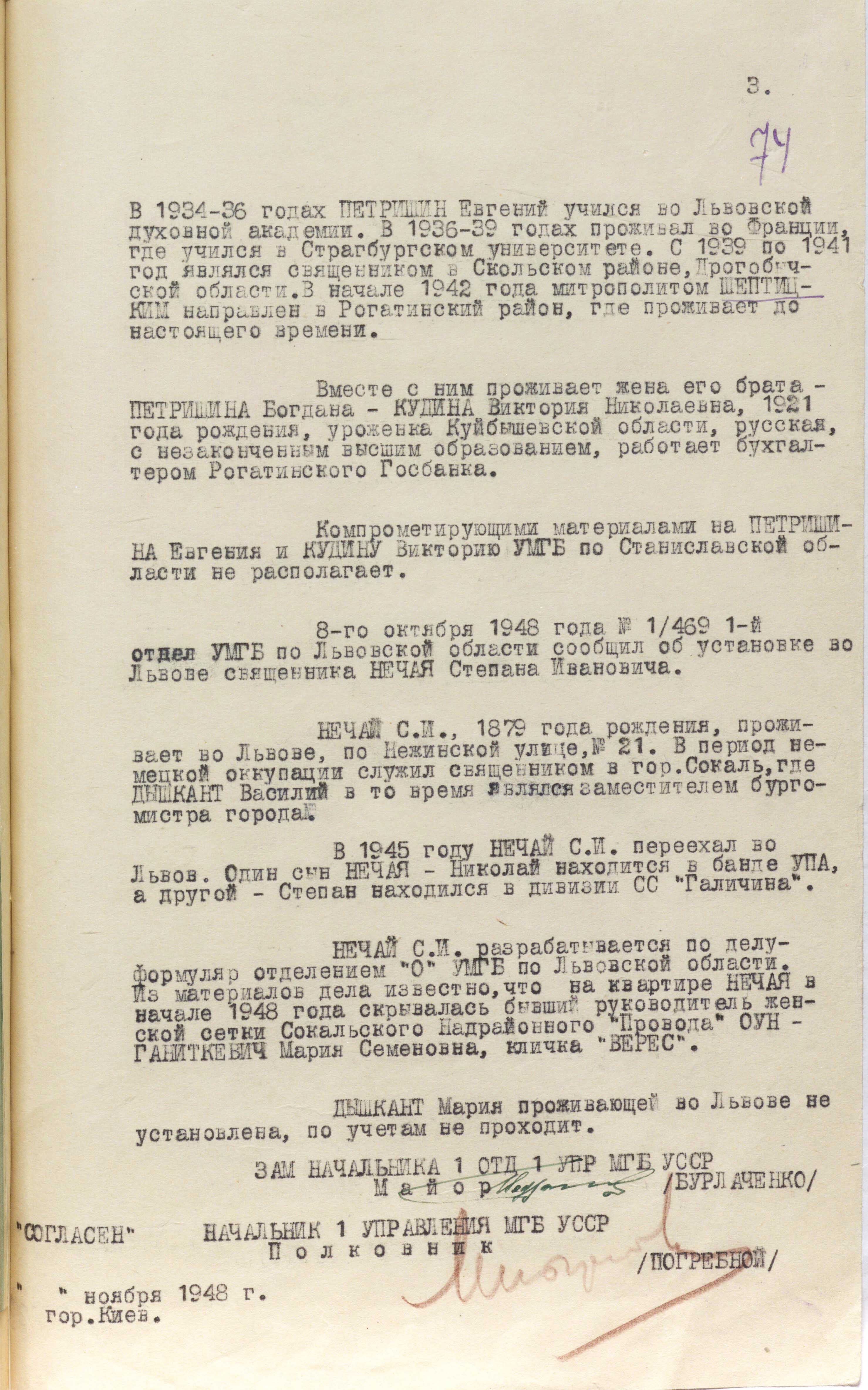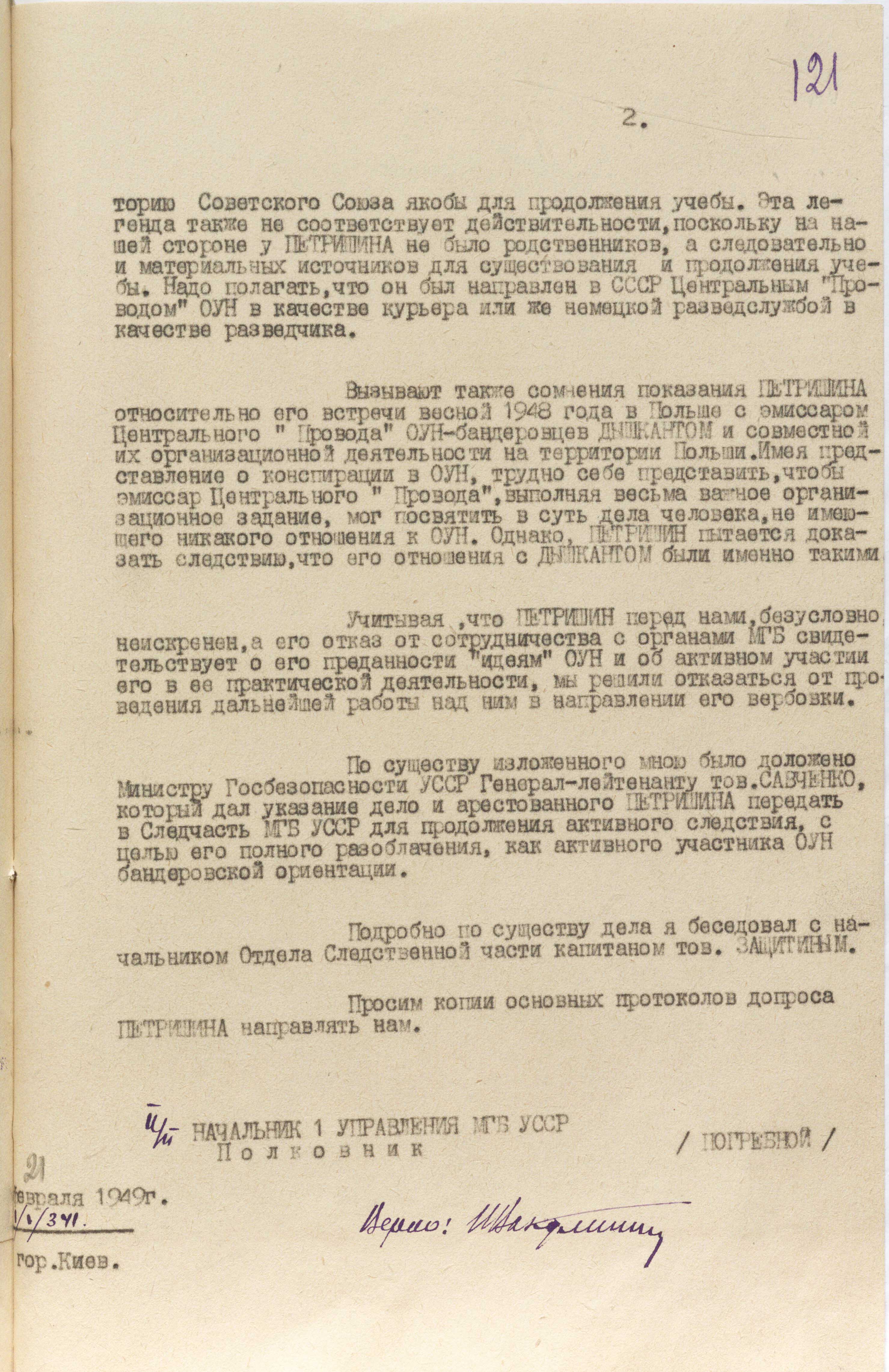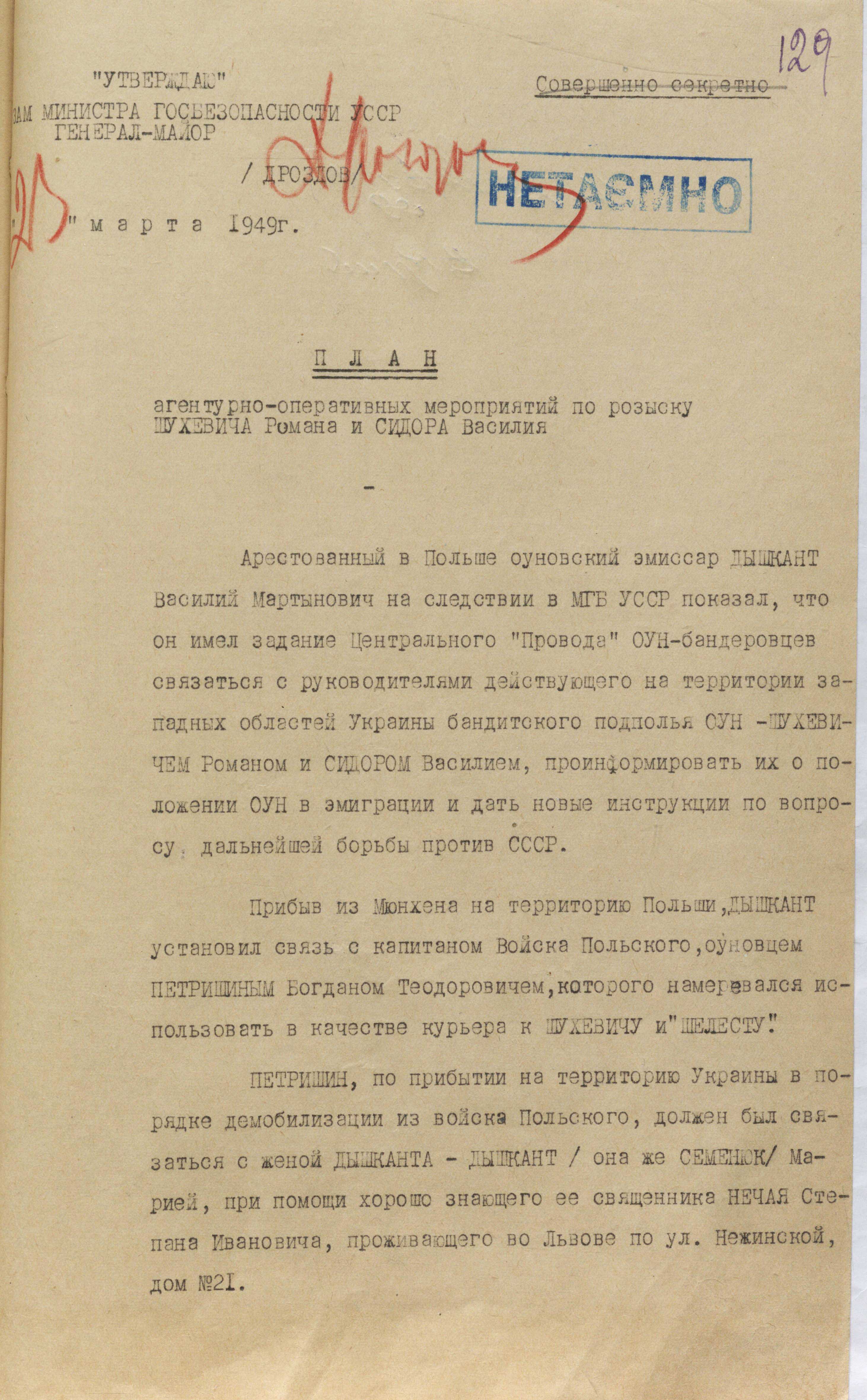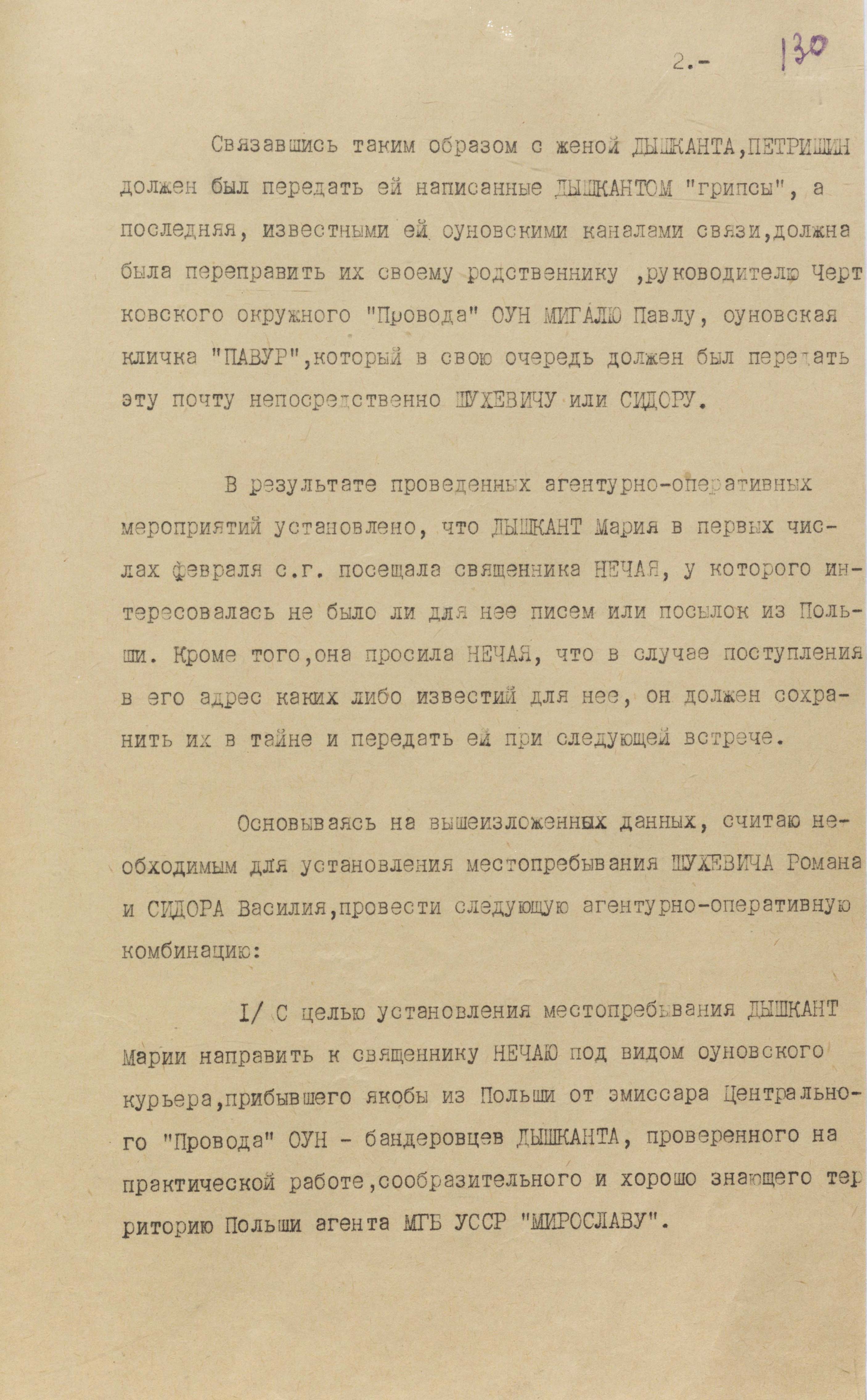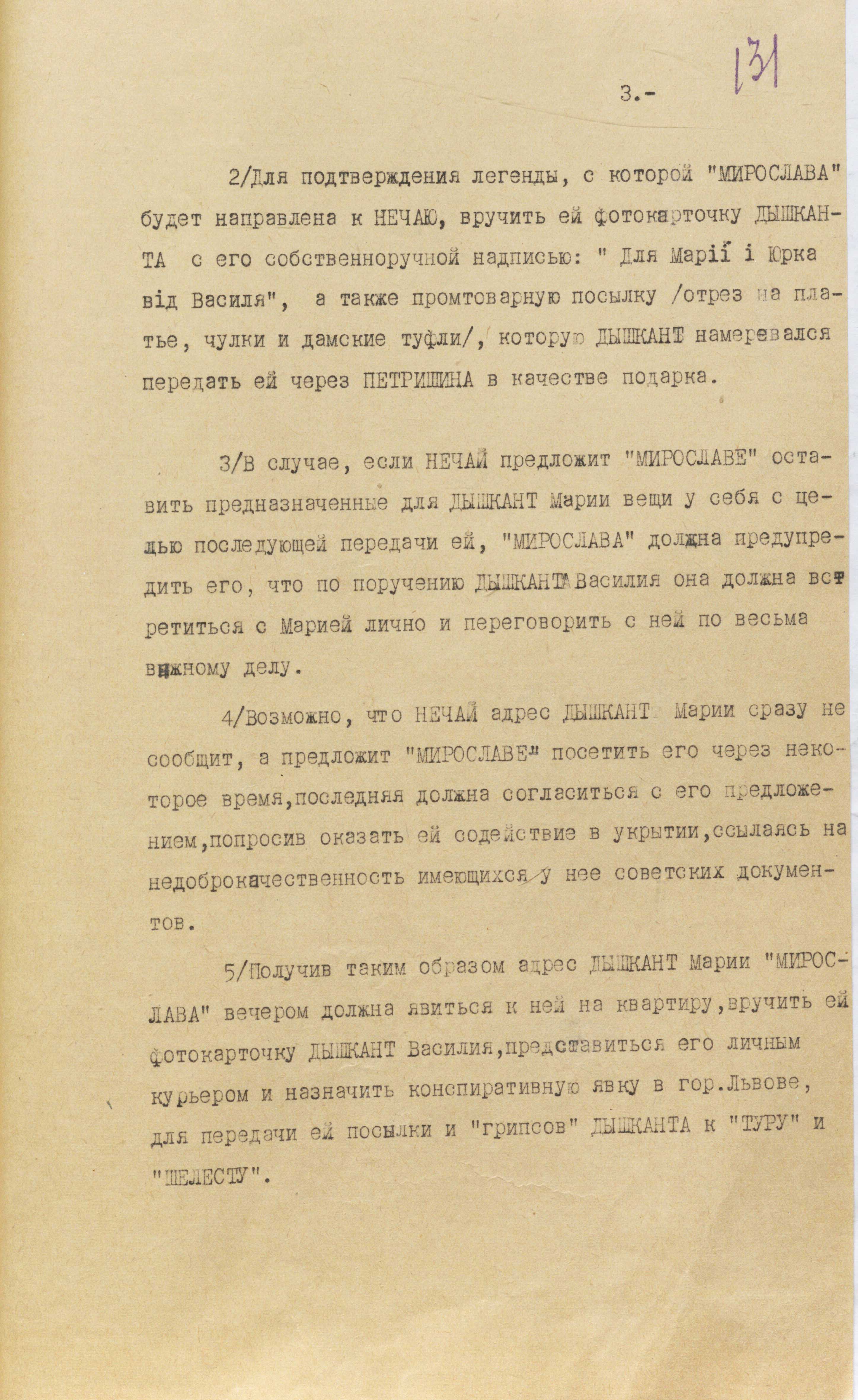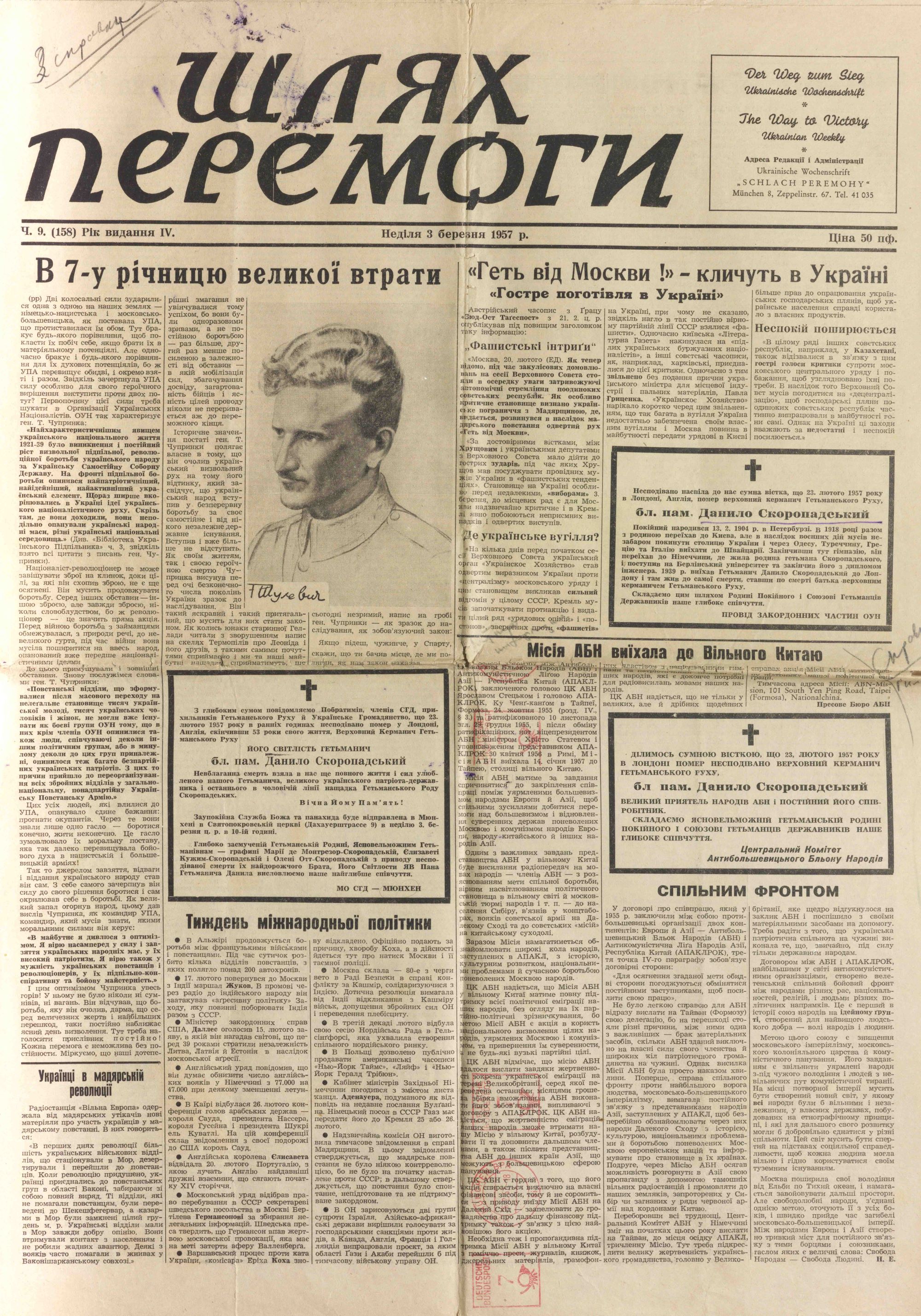To Track Down Roman Shukhevych. The mgb’s Unsuccessful Attempt
3/5/2024
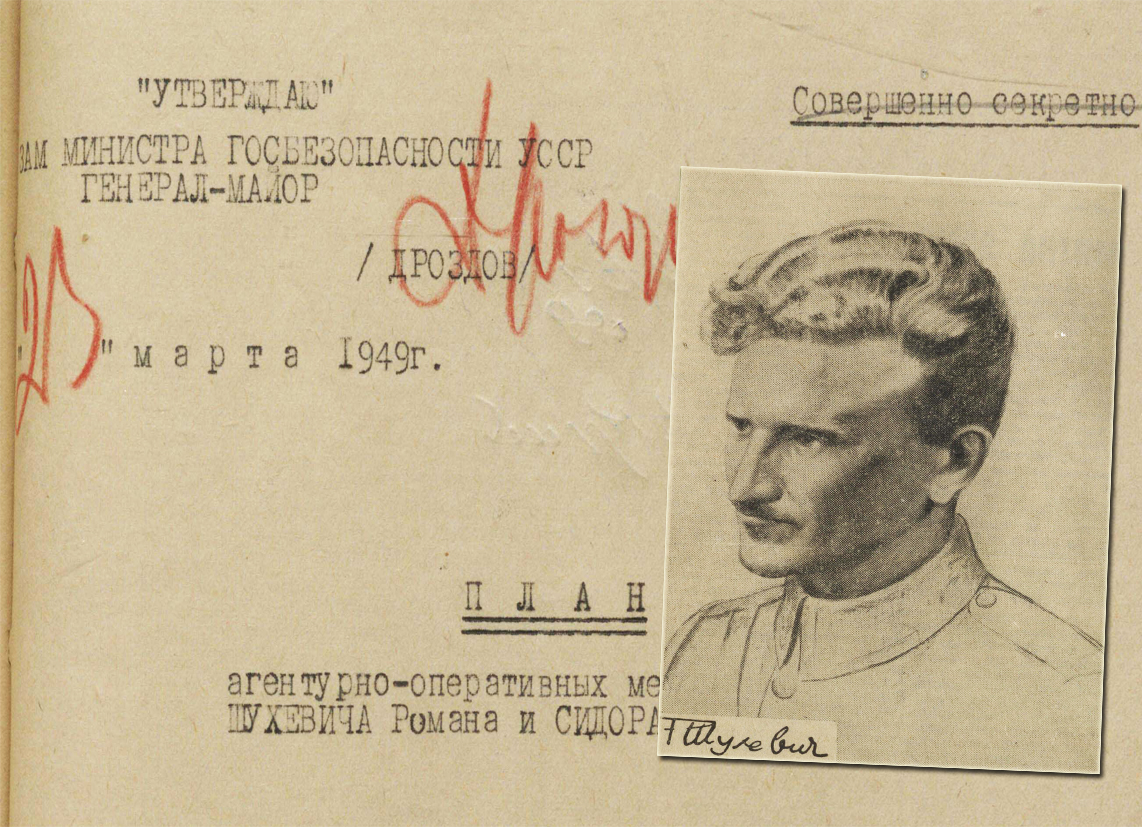
In the archives of the Foreign Intelligence Service of Ukraine, documents were found about a little-known operation of the ussr mgb related to the attempt to find out the whereabouts of the UPA Commander-in-Chief Roman Shukhevych in 1948-1949. In order to achieve this goal, the chekists involved the state security agencies of the Polish People's Republic, made a series of arrests in Poland and in the Ukrainian ssr, and resorted to their usual practice of persuading couriers sent by the OUN leadership to Ukraine on a special mission to the rebel leader to cooperate.
Stepan Bandera’s Emissary
In general, the mgb had many plans and operations to find R. Shukhevych. But all of them were unsuccessful. It was only on March 5, 1950, that the chekists managed to track him down in the village of Bilogorshcha near Lviv. This was the result of a large-scale chekist-military operation. That time he failed to escape from the encirclement. He had to take the last unequal battle, in which the UPA Commander-in-Chief was killed. At the same time, under certain circumstances, the mgb officers could have found his place of hiding a year and a half earlier. But not everything went as they planned.
Those events date back to the end of 1947. Stepan Bandera sent his emissary Vasyl Dyshkant from Munich to meet with R. Shukhevych. But he did not reach Ukraine. He was detained by the state security bodies of the Polish People's Republic, which at that time were already actively cooperating with soviet special services within the framework of the social camp. During interrogations, the mgb officers, to whom V. Dyshkant was handed over under the agreement with the Polish side, forced him to confess where and with what task he was going. However, they failed to recruit him and force him to participate in the operation to find R. Shukhevych. As a result, he was arrested on the territory of the ussr, subjected to new interrogations, and eventually sentenced to 25 years in prison. This is the commonly known information about this event. At the same time, declassified materials from the SZRU archive allow us to learn the details of this story, which lasted for almost two years.
According to the documents, Vasyl Martynovych Dyshkant, codename “Derkach”, born in 1911, a native of the city of Sokal, Lviv region, on the instructions of the Central Provid of the OUN (b), in December 1947 illegally arrived in Poland with forged documents. Later, he was supposed to cross the Polish-Ukrainian border, find R. Shukhevych and give him instructions on new tactics, including the need to minimize UPA fighting and save forces for further struggle. In exchange, he was to receive information about the activities of the underground in Ukraine and return.
On the territory of Poland, V. Dyshkant had to establish contact with the leaders of the OUN Provid of the Zakerzonia territory, “Styah”, “Orest” or “Dalnych”, who would help him illegally cross the border and find the UPA Commander-in-Chief. But due to the death of “Stiah” and other circumstances, this was not possible. So he was forced to look for other ways and, most importantly, for people committed to the Ukrainian cause whom he could fully trust. Therefore, he got in touch with a Ukrainian, Petryshyn Bohdan Teodorovych, who had just resigned from the Polish army, where he had served as a captain, and was about to return to Ukraine after demobilization.
According to the plan, B. Petryshyn had to find V. Dyshkant's wife in Ukraine and give her all the necessary materials. She was to deliver the package to the referent of the Sokal District Office of the OUN, Pavlo Myhal (codename “Pavur”), who was married to her sister. “Pavur” was entrusted with the mission to meet with R. Shukhevych. These issues were discussed in detail during the meetings. And it was at this stage that both were simultaneously arrested.
“I Will Not Work Against the Ukrainian People”
The archival documents do not tell how this OUN network was uncovered in Poland. There are only excerpts from the protocols of the interrogation of V. Dyshkant, B. Petryshyn and other figures, and the mgb’s plans aimed at squeezing the best out of the situation and trying to get on the trail of R. Shukhevych with the help of the arrested persons.
Since Stepan Bandera's emissary refused to cooperate, they started cultivating B. Petryshyn. They found out that on the eve of the Second World War, in 1939, he was arrested (together with other OUN members) by the Polish counterintelligence for conducting underground activities. His close relatives were immediately identified in the town of Rohatyn in the then Stanislav region. His wife, son, mother and brother lived there, waiting for him to return home from Poland. B. Petryshyn was told that they were looking forward to the meeting by an mgb officer, who under a certain legend, visited Rohatyn and conveyed greetings from Bohdan, allegedly his good friend. The chekists themselves came up with this combination.
When the mgb officer told the arrested person about his encounter, Bohdan got very nervous and worried. This was the effect they were hoping for. According to archival documents, after that he was informed that he would soon be able to count on visits, and in the future – on living happily together with his family. But first, he had to accept the offer of cooperation, which he had previously rejected, and to agree to perform certain tasks.
The chekists knew that B. Petryshyn was very concerned about the fate of his family and wanted to return home as soon as possible. This is exactly what was used in the operational game. The long silence that followed the news about his family was interpreted as hesitation. So they did not insist on a quick response. They told him to think it over and took him back to his cell.
“After returning to the cell”, one of the papers states, “he thought for a long time about the proposal, weighing all the circumstances related to his fate and the fate of his family in case of his conviction or release, and came to the final decision that despite any repressive measures that could be applied to him personally and his family in case of his refusal to cooperate, he does not intend to link his fate with the mgb, as his “conscience does not allow him to be a provocateur and betray his own people”(BSA of the SZR of Ukraine. - F.1. – Case 8162. – P. 117).
He apparently said this phrase, quoted in the document, during another conversation. Thus, the chekists received B. Petryshyn's refusal to cooperate for the second time, but they did not give up their intentions. Mykola Pohribnyi, the chief of the 1st department of the mgb of the Ukrainian ssr, personally took up the case. Once again, in “bright colours”, he described to the arrested man what awaits him and his family in case of a negative answer. And then he again raised the issue of cooperation. According to the documents, B. Petryshyn replied: “I will not work against the Ukrainian people”, After that, he stopped answering any questions at all.
Taking this into consideration, the chekists decided to finally abandon attempts to recruit B. Petryshyn and handed him over to the investigative unit of the mgb of the Ukrainian ssr “for a more thorough investigation of his criminal activities as an active member of the OUN(b)”. There is no information in the archives of the Intelligence Service on how the investigation was carried out. Instead, a chain of further searches for R. Shukhevich's hiding place can be traced.
The chekists had the information that B. Petryshyn had to hand over all the necessary materials to V. Dyshkant’s wife Maria. So all efforts were focused on finding her. All they knew was that she lived somewhere near Lviv and periodically visited her acquaintance, a Greek- Catholic clergyman Stepan Nechai, in the city. She asked him if he had any news for her from her husband from abroad.
The chekists did not establish operational contact with the priest. It turned out that the mgb in Lviv region was investigating him as an active Ukrainian nationalist who served anti-soviet sermons to the faithful, and after the Greek Catholic Church was banned, he conducted illegal religious services at his home. In addition, his sons were in the UPA. So he was a person who could not be trusted. Therefore, they decided to carry out an operational combination.
This is stated in the “Plan of agent-operational measures for seeking Roman Shukhevych and Vasyl Sydor”, approved by deputy minister of state security of the Ukrainian ssr Viktor Drozdov on March 23, 1949. They planned to send to Nechai an mgb agent under the guise of a courier from V. Dyshkant, who was “clever and well-versed in the territory of Poland”. She was to be given a photo of V. Dyshkant with the inscription on the back “To Maria and Yurko from Vasyl”, as well as a package with women's shoes, stockings and fabric for a dress - that is, a gift that, according to the previous plan, was to be sent by B. Petryshyn.
In communication with the clergyman, the agent had to insist on a personal meeting with V. Dyshkant's wife, during which she allegedly intended to hand over the gifts, a package with a letter and other instructions “from the other side”.
“After the meeting”, the plan stated, “Maria Dyshkant should be secretly arrested and taken to the mgb in Lviv region, where she should first be accused of profiteering in manufactured goods and currency, and after she gives her real surname, first name and patronymic, move on to the question of her practical OUN activities and the nationalist activities of her husband. After confessing to participation in the OUN movement, Dyshkant Maria should be recruited as an agent to be used in our interests in the case of Shukhevych, Sydor and Myhal” (BSA of the SZR of Ukraine. - F.1. – Case 8162. - P. 132).
The archival documents do not tell whether this particular plan was carried out. Instead, it is reported that in May 1949, Maria Dyshkant and her sister were tracked down in Lviv and detained. The mgb tried to get a confession from them about their participation in the OUN underground and consent to further cooperation in tracking down R. Shukhevych. But they reportedly did not make any confessions. Therefore, they were arrested.
Further operational cultivation showed that the underground had somehow learnt about the arrest of Vasyl Dyshkant and Bohdan Petryshyn. Therefore, all further measures, which were planned to be carried out allegedly on their behalf, no longer made sense. This is how one of the operations to find out the location of the UPA Commander-in-Chief Roman Shukhevych ended without result. It showed that in that situation, neither persuasion and promises, nor threats, arrests, numerous combinations and tricks allowed the chekists to persuade the Ukrainian underground to cooperate and betray. To many underground members, the figure of R. Shukhevych associated with the continuation of the struggle, with a force that could maintain faith in a better future for Ukrainians in that difficult situation.
“All these people who joined the UPA”, reads an article on the anniversary of R. Shukhevych’s death in a newspaper preserved among archival documents, “were driven by a single desire: to drive out the occupiers. Because of this, they knew only one slogan – to fight is a must, to live is not a must. This slogan determined the moral attitude, which far exceeded the morale in the Nazi and bolshevik armies! So the source of zeal, courage and dedication of the Ukrainian people was the Ukrainian people. It drew from itself the strength for its decision to fight and was winged in the fight. Chuprynka, as the Commander of the UPA, who did know what moral forces he controled, gave this description of the great spirit that enveloped the people: “I look into the future with optimism. I believe first of all in the strength and zeal of the Ukrainian masses, in their high patriotism. I also believe in the courage of Ukrainian insurgents and revolutionaries, in their underground conspiratorial and combat skills” (BSA of the SZR of Ukraine. - F.1. - Case 10490. - Vol. 2. - P. 176).
